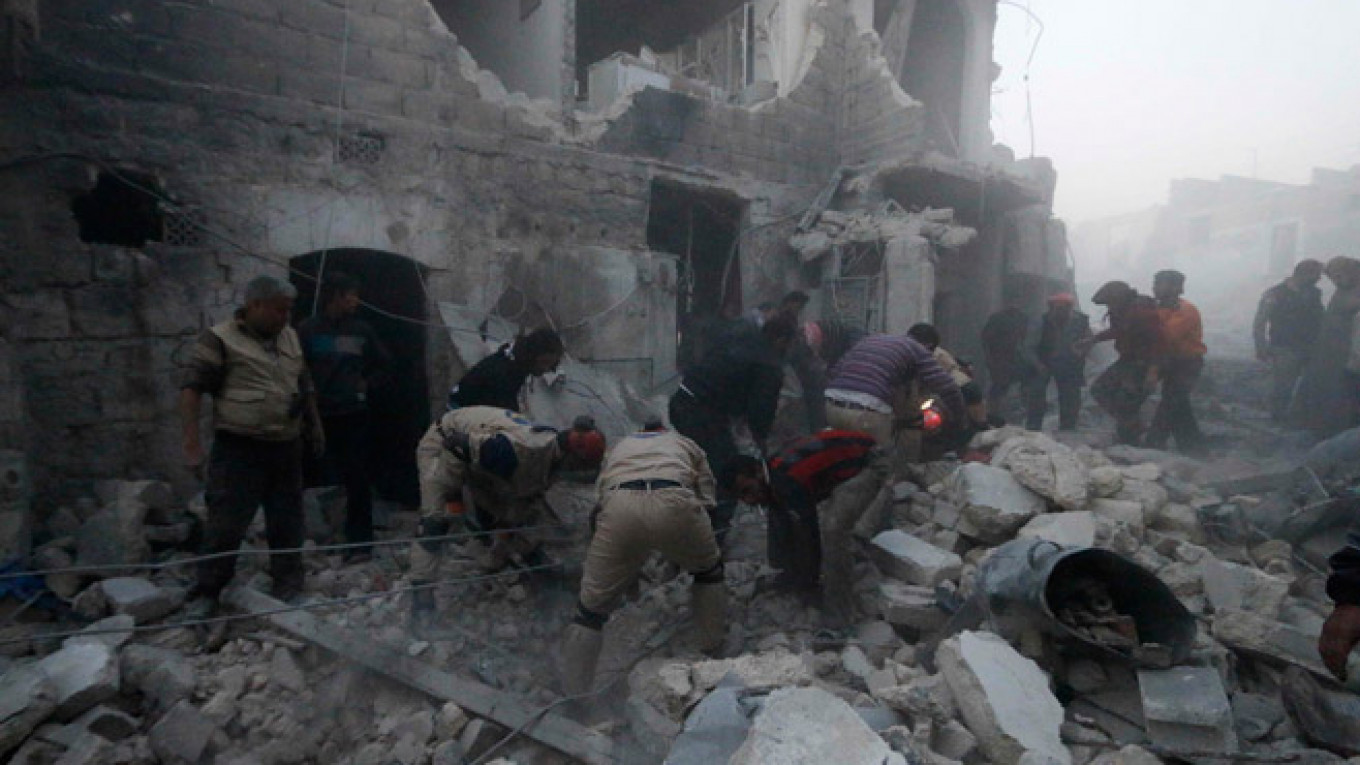During a visit to Moscow last week, I was struck by how little Russians seem to know about the barrel bombs that the Syrian government uses to kill civilians, with devastating effect. I heard a lot of "we told you so" about how the rise of the Islamic State justifies Russia's support for Syrian President Bashar Assad's military operations.
But there was little appreciation that Assad's barrel bombs have nothing to do with defending against the Islamic State and have unlawfully killed far more civilians than the Islamic State has.
The barrel bomb is a horrible weapon, designed mainly to kill and terrorize civilians. It is an oil drum or similar barrel filled with explosives and shrapnel. The Syrian air force typically drops it from a helicopter hovering at high altitudes to avoid anti-aircraft fire. At that distance, it is impossible to target with precision. The barrel bomb tumbles to earth, making its dreaded swishing sound as its contents shift back and forth, until it hits the ground and explodes.
The barrel bomb is so imprecise that the Syrian military doesn't dare drop it near the front lines for fear of hitting its own troops. Rather, it is dropped well into territory held by rebel groups. The Syrian military drops it knowing it will destroy apartment buildings, hospitals and schools.
It has made life so miserable for many civilians that some who do not flee the country are choosing to move their families near the front line, preferring to brave snipers and artillery rather than the horror of the barrel bombs.
Instead of advancing any legitimate military purpose, barrel bombs punish entire communities for their presumed political sympathies. Needless to say, targeting civilians is a serious violation of international humanitarian law — a war crime.
Stopping this barrel-bombing of civilians may be the most important thing that could be done to spare civilian life in rebel-held parts of Syria. The Russian government recognized in a United Nations Security Council resolution in February that barrel bombs are being used in populated areas. That same resolution called for the Security Council to take further steps if violations continued. Yet Russia has refused to use its enormous influence on Damascus to stop the barrel-bombing. Rather, it has been facilitating Assad's civilian-killing machine by providing military assistance, including servicing Assad's helicopters.
In Moscow, I heard several arguments for this indifference, none convincing. Some stressed the need to contain the Islamic State. That is certainly a valid aim, but because barrel bombs are so imprecise, their impact on fighters in populated areas is negligible compared with their devastation of civilian life. Indeed, if anything, barrel bombs bolster the Islamic State, permitting it to contend that it is trying to stop Assad's slaughter of civilians.
Some argued that the best way to stop the barrel bombs is with a peace agreement, which the Russian government is trying to secure. But few believe that a peace accord will come soon. In the meantime, there is no reason that Russia couldn't use its leverage to stop the ongoing, awful barrel-bombing of civilians.
Others pleaded a lack of leverage. But if Russia convinced Assad to give up his chemical weapons, it certainly has the leverage to convince him to stop the barrel-bomb attacks on civilians.
I heard arguments about geopolitical "context" — that it is politically unfair to single out barrel bombs when other weapons are being used to kill civilians as well. Pressure should be exerted to stop any form of deliberate or indiscriminate attack on civilians. But is Russia really going to insist on holding out for the perfect before accomplishing the good?
In the last year, the Kremlin successfully pressed Damascus to permit cross-border humanitarian aid. If Russia wants to further demonstrate positive leadership in Syria, it should also insist on an end to the indefensible barrel-bombing of civilians.
Kenneth Roth is executive director of Human Rights Watch. Follow him on Twitter @KenRoth.
A Message from The Moscow Times:
Dear readers,
We are facing unprecedented challenges. Russia's Prosecutor General's Office has designated The Moscow Times as an "undesirable" organization, criminalizing our work and putting our staff at risk of prosecution. This follows our earlier unjust labeling as a "foreign agent."
These actions are direct attempts to silence independent journalism in Russia. The authorities claim our work "discredits the decisions of the Russian leadership." We see things differently: we strive to provide accurate, unbiased reporting on Russia.
We, the journalists of The Moscow Times, refuse to be silenced. But to continue our work, we need your help.
Your support, no matter how small, makes a world of difference. If you can, please support us monthly starting from just $2. It's quick to set up, and every contribution makes a significant impact.
By supporting The Moscow Times, you're defending open, independent journalism in the face of repression. Thank you for standing with us.
Remind me later.


